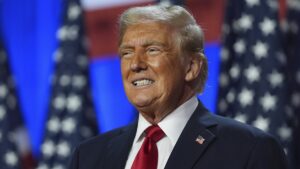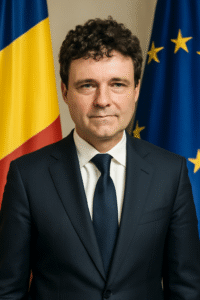Romania’s Presidential Election: Nicușor Dan’s Victory and the Shift Towards Pro-European Union Leadership
In Romania’s recent presidential election runoff, the pro-European Union (EU) candidate Nicușor Dan defeated his rival, a hard-right nationalist, in a closely contested race. This result has sent a powerful message both within Romania and beyond its borders. The victory of Dan, a former mayor of Bucharest, signals a clear desire among the Romanian electorate for stronger ties with the EU and a move towards a more progressive, democratic future. Romania’s Presidential Election: Nicușor Dan’s win marks a shift towards pro-European Union leadership, signaling a new direction for the country. His victory highlights Romania’s commitment to European integration and democratic values.
As Romania looks forward to the next phase of its political landscape, Dan’s success is expected to bring about key changes in the country’s governance, focusing on modernization, stability, and aligning Romania more closely with European values. Let’s dive deeper into the significance of the election results, the profiles of the candidates, and the broader implications for Romania’s future and its relationship with the European Union.

The Significance of the Election Outcome
The presidential runoff was one of the most closely watched elections in Romania’s history. Romania has faced significant political instability in recent years, with corruption scandals, economic challenges, and public dissatisfaction. The election was, therefore, more than just a contest between two political figures; it was a referendum on Romania’s future direction. Would the country continue down a path of populism and nationalism, or would it choose to align itself with EU values of democracy, freedom, and modernization?
Nicușor Dan’s victory is a resounding endorsement of pro-European policies. His platform highlighted Romania’s importance in the European Union and its dedication to advancing democratic reforms. Romania, which joined the EU in 2007, has faced criticism over the years regarding its handling of corruption, judicial independence, and human rights. Dan’s win promises to continue addressing these issues while reinforcing Romania’s European identity. This marks a shift away from nationalist movements, which have gained traction across Europe in recent years, threatening to disrupt the unity of the European Union.
Dan’s victory is particularly important at a time when many EU countries are grappling with internal challenges, including the rise of populism, economic crises, and the migrant issue. Romania’s choice to elect a pro-EU leader underscores the country’s determination to be part of a stable and united European bloc. As a result, Romania is poised to strengthen its partnerships within the EU, fostering a more secure, prosperous future for its citizens.

The Profile of Nicușor Dan
Nicușor Dan is no stranger to the Romanian political scene. He first rose to prominence as a civil society activist, fighting against corruption and pushing for greater transparency in Romania’s public institutions. His work has earned him significant respect among the Romanian electorate, particularly in urban areas, where his message of good governance and reform resonates with voters frustrated by years of political corruption and inefficiency.
Before entering politics, Dan was known for his role as a founder of the Save Bucharest Union (Uniunea Salvați Bucureștiul, USB), a civic movement focused on tackling corruption and improving urban infrastructure. He served as a member of Romania’s parliament and later became the mayor of Bucharest. In these roles, he earned a reputation for pushing forward critical urban reforms, particularly in the areas of transportation, housing, and environmental policies.
Dan’s presidential campaign was centered around a vision of Romania’s future in the EU. He promised to prioritize strengthening Romania’s democratic institutions, increasing transparency in governance, and rooting out corruption. His experience in local government gave him a pragmatic approach to leadership, which many voters found appealing, especially after years of political scandals and mismanagement.
Dan’s victory also marked a symbolic break from the dominance of Romania’s traditional political parties, many of which have been marred by corruption scandals. His success highlighted the growing disillusionment with the establishment and the electorate’s desire for change. Dan’s ability to inspire hope for a cleaner, more accountable government was crucial in his election win.
The Rival Candidate: The Hard-Right Nationalist
On the opposite side of the political spectrum was the hard-right nationalist candidate, whose campaign was largely focused on anti-EU rhetoric and traditional nationalist values. This candidate argued that Romania’s membership in the EU had resulted in the loss of national sovereignty and that Romania needed to focus on protecting its own interests at the expense of EU cooperation.
The nationalist candidate’s rhetoric resonated with a significant portion of the Romanian electorate, particularly those who felt left behind by globalization and the EU’s economic policies. These voters believed that Romania’s membership in the EU had brought challenges, including economic hardship, increased immigration, and a perceived erosion of national identity.
While the nationalist candidate garnered a strong following, particularly in rural areas, Dan’s message of European integration and modernity ultimately prevailed. The hard-right candidate’s polarizing message failed to gain traction among the urban middle class, which is crucial to winning national elections in Romania. Many voters in urban areas, particularly in Bucharest, where Dan has had significant success, favored his platform for its promise of political stability and greater integration with the EU.
Implications for Romania’s Future
Nicușor Dan’s win has significant implications for Romania’s future. The most immediate impact will likely be seen in Romania’s relationship with the European Union. Dan’s pro-European stance means that Romania is likely to continue pushing for stronger economic and political ties with the EU, focusing on issues such as trade, investment, and regional cooperation. His presidency is expected to prioritize domestic reforms aimed at improving Romania’s legal and political institutions, which have often been criticized for corruption and inefficiency.
Romania is one of the largest beneficiaries of EU funding, and under Dan’s leadership, the country will likely continue to seek access to EU financial support for infrastructure, education, and public health. Additionally, Romania has been involved in various EU initiatives, including the European Green Deal, which aims to reduce carbon emissions and promote sustainable development. Dan’s commitment to environmental reform and modernization aligns with the EU’s long-term goals.
Dan’s victory also brings hope for improvements in Romania’s judicial system. Romania has struggled with persistent issues surrounding corruption and the autonomy of its judiciary. In response, Dan has pledged to advocate for significant reforms within the judicial system. His presidency could bring about changes that help restore trust in the country’s legal institutions and reduce corruption at all levels of government.
On the international stage, Dan’s victory strengthens Romania’s position within the EU. Romania has been a key ally of EU institutions in recent years, and Dan’s leadership is expected to enhance this relationship. As Europe faces complex geopolitical challenges, including tensions with Russia and the ongoing refugee crisis, Romania’s alignment with EU values of democracy, human rights, and rule of law will be crucial in maintaining stability in the region.
The Reaction from the EU and International Community
The victory of Nicușor Dan was met with a warm reception from the European Union and international leaders who welcomed the outcome as a reaffirmation of Romania’s commitment to democratic values. EU officials have expressed their support for Dan’s agenda, particularly his efforts to combat corruption and strengthen Romania’s position within the union.
European Commission President Ursula von der Leyen congratulated Dan on his victory, noting that Romania’s future success is closely tied to its continued integration into the European project. Von der Leyen highlighted the importance of Romania’s participation in EU-wide initiatives, including the European Green Deal and the Digital Single Market, which are essential for fostering economic growth and tackling global challenges such as climate change and technological innovation.
Other international leaders, including the United States, also expressed their congratulations to Dan. The U.S. government has long supported Romania’s membership in NATO and the EU, and Dan’s pro-European stance aligns with U.S. foreign policy objectives in the region. Romania’s role as a NATO member and a partner of the United States is expected to continue strengthening under Dan’s leadership.
Public Reactions and Protests
While the election results were widely praised in urban centers and pro-EU circles, there were protests and discontent in some rural areas. Supporters of the nationalist candidate held protests, arguing that the election was rigged or that the victory of a pro-EU candidate would lead to further economic hardship and loss of national identity. These protests, however, were relatively small-scale compared to the widespread celebrations in Bucharest and other urban areas.
The nationalist rhetoric continues to have a significant hold on some segments of the Romanian population. However, the fact that a pro-European candidate was able to secure such a decisive victory suggests that Romania is moving toward a more centrist, pro-EU future, despite the challenges posed by populist movements.
Conclusion
Nicușor Dan’s victory in Romania’s presidential election is a decisive step towards reinforcing Romania’s commitment to the European Union. His platform, which emphasizes democratic reforms, anti-corruption measures, and a modernized economy, promises a brighter future for Romania within the European community. With Romania continuing to face challenges such as corruption, economic inequality, and political instability, Dan’s leadership offers hope for positive change. His win reflects a broader trend in Europe towards pro-European leadership, signaling a commitment to stability, growth, and stronger EU integration.
As Romania embarks on this new political chapter, the hope is that Dan’s presidency will bring long-needed reforms and strengthen Romania’s position both within the EU and on the global stage. The road ahead is not without challenges, but the election results demonstrate that Romania is ready for change and progress, aligning itself with European values and vision for the future.





